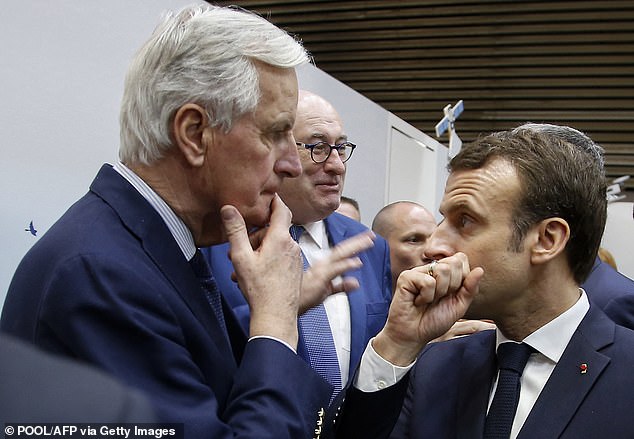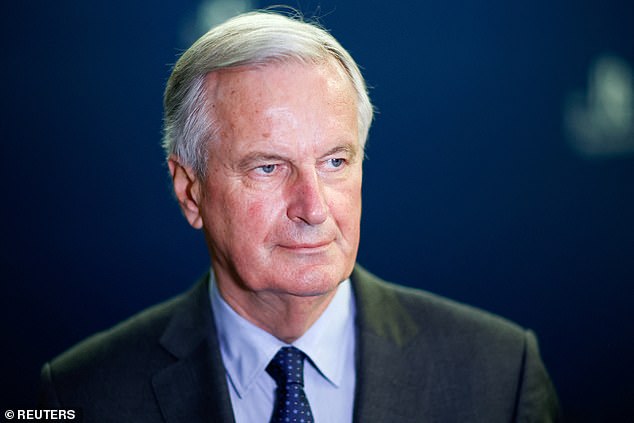Former Brexit negotiator Michel Barnier was announced as France’s new prime minister today, nearly two months after France’s snap election ended in political deadlock.
The 73-year-old now faces the daunting task of forming a government that will have to survive a National Assembly divided into three large political blocs, none of which is capable of forming a clear majority.
Following the recent political stalemate, President Emmanuel Macron has now asked Mr Barnier to take on the esteemed role, even though he is not a sitting elected MP.
An official at Matignon, the prime minister’s official residence in Paris, said Thursday afternoon: “Michel Barnier has been appointed prime minister by President Macron.”
The appointment means Barnier will become the oldest prime minister in the history of the Fifth Republic, replacing the youngest prime minister, Gabriel Attal, who is 35.
Michel Barnier, 73, was announced today as France’s new prime minister.

Barnier pictured with Emmanuel Macron at the Elysee Palace in Paris, on January 31, 2020, a few hours before Britain officially left the European Union.
Mr Barnier immediately faces the possibility of a vote of no confidence in Parliament, due to his apparent lack of democratic legitimacy.
Since the announcement, Macron appears to be counting on the far-right National Rally party of three-time presidential candidate Marine Le Pen not to block Barnier’s appointment.
RN party leader Jordan Bardella said Barnier would be judged “by the evidence” when he addresses parliament.
Green leader Marine Tondelier responded: “In the end we know who decides. Her name is Marine Le Pen. It is to her that Macron has decided to submit.”
Barnier last served in parliament in 1993 and is currently a member of the Les Républiques (LR) party, the current name of the opposition Gaullist conservatives.
Pressure has been mounting on President Macron to appoint a prime minister after a coalition led by his Renaissance party came second in a snap election in early July.
The victory was won by the Popular Front, a left-wing coalition whose specific objective was to prevent the far-right National Rally party from coming to power.
Barnier did not emerge as a serious candidate to lead a new French government until Thursday, when he was spotted at the Elysee Palace.
He attempted to become LR’s presidential candidate in 2022, but was eliminated in the first round of the party’s vote with less than five percent of the vote.
During the campaign, he took a hard line on immigration, saying it was “out of control.”
France is approaching a deadline to start discussions on its 2025 budget, at a time when the country is facing harsh criticism from the EU for spending too much.
On Thursday, Jean-Philippe Tanguy, a member of parliament for the National Rally, said Barnier represented the “old fossilised world” and accused the Elysée Palace of “returning to Jurassic Park”.
Barnier first became a member of the French parliament aged just 27 in the 1970s and first entered government in the mid-1990s under the late President Jacques Chirac.
Such is the longevity of Barnier’s high-profile political career that some refer to him as the “French Joe Biden”, after the American leader whose long career spanned a similar period.
The Brexit hardliner who once described British Prime Minister Boris Johnson as a “bulldozer” led EU talks with Britain over its exit from the bloc from 2016 to 2021.

Barnier has been named France’s new prime minister, the Elysee Palace announced on September 5, nearly two months after legislative elections left the country in a political deadlock. Pictured: Barnier and Macron at the 56th International Agricultural Show (Salon international de l’Agriculture) at the Porte de Versailles exhibition centre in Paris, on February 23, 2019
He served four times as a cabinet minister and twice as a European commissioner before becoming head of the Brexit taskforce in 2016.
Barnier wrote a book about Brexit, ‘My Secret Brexit Diary: A Glorious Illusion’, the title of which clearly expresses what he thought about the idea of the UK leaving the European Union.
Although true to his reputation for politeness, Barnier avoided any salacious gossip in the published work, he never fails to express his amazement at how his British counterparts handled the process.
“There is definitely something wrong with the British system… each passing day shows that they have not realised the consequences of what is really at stake here,” he wrote.
Barnier, who was unsuccessful in the primaries to become the conservative presidential candidate in 2021, is also seen as having views on domestic policy that are more compatible with the far right.
He sparked a wave of backlash when he said France should regain its “legal sovereignty” and not be subject to rulings by the European Court of Justice and the European Court of Human Rights.
He also caused consternation in Brussels by calling for France to free itself from the supervision of the European court.
To regain France’s “room for manoeuvre”, Barnier said he would organise a referendum if elected, asking voters to approve constitutional changes and parliament’s ability to set quotas for immigrants each year.
He said he “really doesn’t like the concept of European sovereignty” and attacked “German dominance” in the European Union, adding: “I know what I’m talking about.”
His appointment has even caused concern among allies: one LR MP, who asked not to be named, said he embodied “everything the French do not want”.
He is ‘disconnected and will continue or end up killing the right,’ they said.
In July, Macron refused to name the alliance’s candidate for prime minister, civil servant Lucie Castets, 37, arguing she was not in a position to govern with stability.


